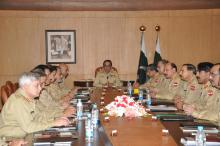Chief of Army Staff Gen. Ashfaq Kayani on April 23 addresses graduating army cadets at Pakistan Military Academy Kakul, about half a kilometer from the compound where Osama bin Laden was located and shot dead eight days later. (Photo: Pakistan Inter-Services Public Relations)
(CNSNews.com) – Breaking his silence on Sunday’s U.S. Navy SEAL operation against Osama bin Laden, Pakistan army chief Gen. Ashfaq Kayani has warned the United States not to contemplate a similar mission in the future.
Pakistan also wants the U.S. to reduce the strength of U.S. military personnel inside the country “to the minimum essential,” he said.
Kayani made the comments during an emergency forum on Thursday with top army brass at headquarters in Rawalpindi, called to discuss the implications of the Abbottabad raid, and “military-to-military relations with the United States.”
An army statement released afterwards said Kayani “made it very clear that any similar action, violating the sovereignty of Pakistan, will warrant a review on the level of military/intelligence cooperation with the United States.”
The statement also implicitly warned the U.S. not to consider a raid against Pakistan’s nuclear weapons facilities.
“As regards the possibility of similar hostile action against our strategic assets, the Forum reaffirmed that, unlike an undefended civilian compound, our strategic assets are well protected and an elaborate defensive mechanism is in place,” it said.
It took a swipe at India, too, warning Pakistan’s eastern neighbor and historic rival not to think about conducting similar operations on Pakistan’s soil.
“Any misadventure of this kind will be responded to very strongly,” the army statement said. “There should be no doubt about it.”
Earlier, Indian army commanders expressed themselves ready and “competent” if called upon to carry out a raid on Pakistan territory against terrorists sheltering there.
Lieut.-Gen. K.T. Parnaik, head of the Indian Army’s Northern Command, was responding to questions relating to camps inside Pakistan belonging to Laskhar-e-Toiba (LeT), the terrorist group that carried out the deadly Nov. 2008 terrorist assault in Mumbai and also operates against coalition forces in Afghanistan.
Wanted terrorist figures known or suspected to be in Pakistan include bin Laden’s number two, Ayman al-Zawahiri, Afghan Taliban leader Mullah Omar, and Hafiz Mohammad Saeed, head of the organization Jamaat ud-Dawa, which the State Department calls a “front operation” for LeT.

Chief of Army Staff Gen. Ashfaq Parvez Kayani presides over a conference of top army officers at General Headquarters Rawalpindi on Thursday, May 5, 2011. (Photo: Pakistan Inter-Services Public Relations)
Defending the ISI
The strongly-worded statement by the Pakistan army was its first public response to the Abbottabad raid.
The location of the al-Qaeda terrorist’s hideout is a significant embarrassment to the Pakistani authorities, and has raised afresh questions about the army – and especially its Inter-Services Intelligence (ISI) agency – colluding with terrorists.
Just a week before bin Laden was killed, Kayani addressed graduating army cadets at the Pakistan Military Academy Kakul – about half a kilometer from the compound where the fugitive was located.
In its report on the April 23 event, the army said Kayani had told the cadets that the military had “broken the backbone of terrorists.”
Thursday’s statement said the army admitted its “own shortcomings in developing intelligence on the presence of Osama bin Laden in Pakistan” but also asserted that the achievements of the ISI “against al-Qaeda and its terrorist affiliates in Pakistan, have no parallel.”
It said that about 100 “top-level” al-Qaeda operatives had been killed or arrested by the ISI, “with or without support of CIA.”
“However, in the case of Osama bin Laden, while the CIA developed intelligence based on initial information provided by ISI, it did not share further development of intelligence on the case with ISI, contrary to the existing practice between the two services,” the statement continued. “Nonetheless, an investigation has been ordered into the circumstances that led to this situation.”
Thursday also saw a shift in tone by Pakistan’s government over the bin Laden affair.
Early this week, Prime Minister Yousuf Raza Gilani called the successful mission a “great victory.”
But on Thursday, Foreign Secretary Salman Bashir warned that another attack of its kind on Pakistan would have “disastrous consequences.”
“The Pakistan security forces are neither incompetent nor negligent about their sacred duty to protect Pakistan,” he told a press conference in Islamabad. “There shall not be any doubt that any repetition of such an act will have disastrous consequences.”
At the same time, Bashir disputed that there was a crisis in bilateral relations.
“The notion that Pakistan-U.S. relations have nosedived, this is not quite our understanding,” he said. “Pakistan considers its relations with the U.S. as of high importance.”
Bashir defended the ISI against allegations of cooperating with terrorists, noting that many of the terrorists most wanted by the U.S. had been caught by the Pakistani agency.
“It’s easy to say that the ISI or elements within the government were in cahoots with al-Qaeda,” he said. “This is a false charge. It cannot be validated on any account and it flies in the face of what Pakistanis, and in particular the ISI, has been able to accomplish.”
In Washington, State Department spokesman Mark Toner said it was unfair to characterize U.S.-Pakistan ties as being in a crisis.
“This is a productive bilateral relationship, and we’re going to continue to cooperate,” he said. “We recognize that we don’t always see eye to eye on every issue or on every approach to these issues. But we believe this is a relationship that is going to continue to make progress.”
Toner deferred to the Pentagon comment on the army’s call to reduce the U.S. military presence. He said that the “relatively small” military contingent in Pakistan at the government’s invitation was “there to perform, train, and equip operations for the Pakistani military.”
Source material can be found at this site.









